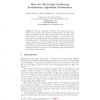Free Online Productivity Tools
i2Speak
i2Symbol
i2OCR
iTex2Img
iWeb2Print
iWeb2Shot
i2Type
iPdf2Split
iPdf2Merge
i2Bopomofo
i2Arabic
i2Style
i2Image
i2PDF
iLatex2Rtf
Sci2ools
GECCO
2004
Springer
2004
Springer
How Are We Doing? Predicting Evolutionary Algorithm Performance
Abstract. Given an evolutionary algorithm for a problem and an instance of the problem, the results of several trials of the EA on the instance constitute a sample from the distribution of all possible results of the EA on the instance. From this sample, we can estimate, nonparametrically or parametrically, the probability that another run of the EA, independent of the initial ones, will identify a better solution to the instance than any seen in the initial trials. We derive such probability estimates and test the derivations using a genetic algorithm for the traveling salesman problem. We find that while the analysis holds promise, it should probably not depend on the assumption that the distribution of an EA’s results is normal.
Related Content
| Added | 01 Jul 2010 |
| Updated | 01 Jul 2010 |
| Type | Conference |
| Year | 2004 |
| Where | GECCO |
| Authors | Mark A. Renslow, Brenda Hinkemeyer, Bryant A. Julstrom |
Comments (0)

